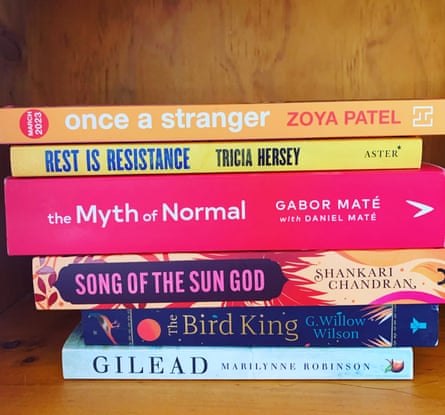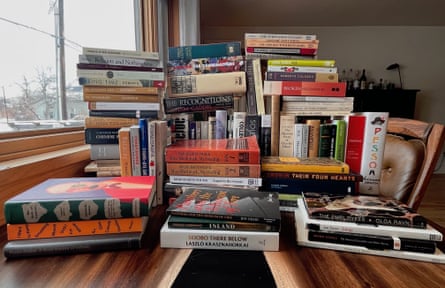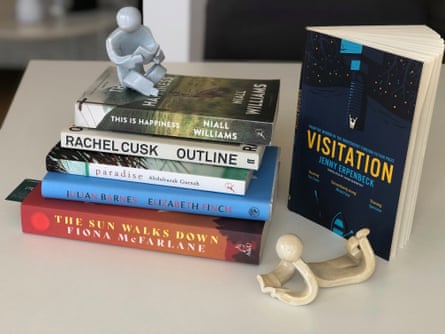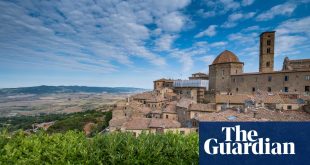We’ve all stretched airline weight limits or our back’s carrying capacity by cramming books into a suitcase, only to return home without having opened a single volume. But books needn’t be sidenotes to a holiday. Make them the stars of your next break and you have an itinerary that’s weather-proof, flight-cancellation-free and Covid-safe to boot. Flex your library card or raid friends’ shelves, and your trip is budget-friendly too.
Consider the summer Jennifer Byrne spent in 19th-century Russia with the “expressionist, complex, psychological stories” of Fyodor Dostoevsky and “gentler novels” of Leo Tolstoy. “They were like mountains that you knew you’d one day have to climb,” says the former host of ABC TV’s The Book Club.
These Russian classics are epic: Dostoevsky’s The Brothers Karamazov is around 800 pages and Tolstoy’s War and Peace stretches over 1,200. Such heavyweight novels get pushed down the to-read list throughout the year, but on a book-devoted holiday they’re a lot more conquerable. Byrne recalls working through these titles “in a happy way” – by rewarding herself with chocolate during challenging parts.

Sarah Malik finds similar joy in “losing myself in novels and unread stacks I didn’t have time to read during the year”. The writer, podcaster and editor of Safar – a collection of travel accounts by Muslim women – constantly juggles reading obligations for work. So it was a joy, she says, to “completely switch offline” over summer and read purely for pleasure.
“In periods where I’ve gotten really busy, I’ve romanticised deeply awful experiences just so I could read books,” says Benjamin Law, writer and co-host of ABC RN’s Stop Everything!
It’s a common, warped fantasy: that having a broken leg will finally give us time to work through those unopened memoirs and mysteries. But the solution can be less drastic – like disconnecting from nonessential digital communication and entertainment, as Law had to do for an upcoming TV project. “I brought all these books that I’ve been meaning to read and it was great,” he says. “I didn’t know that I could read a whole book in one day. I didn’t know I was physically capable of it. I didn’t know it was legal!”

For freelance producer and DJ Colin Ho, books are so key to his holidays, he’s strategised the best way to travel with them.
“I’ll usually have a slim paperback in a jacket pocket,” he says. “And yes, I do pick jackets based on whether they’ll fit a slim paperback.” A medium-to-heavy title gets tucked into his backpack; there’s a partition of publications in his checked suitcase. “The e-reader is always the backup,” he says. If your bulging bag can’t fit a finished book, post it home, he says.
In her memoir Wild, Cheryl Strayed literally burns through 11 titles while walking America’s Pacific Crest Trail. She describes the guilt at setting alight the pages of William Faulkner to reduce her backpack load. Her bestseller is about grieving her mother’s death, but it’s also about the saving grace of books. “They were the world I could lose myself in when the one I was actually in became too lonely or harsh or difficult to bear,” she writes.

Finding refuge in words can be educational and perspective-changing. “And it’s cheap, for another thing, compared with most holidays,” says Chris Stokes. He has taken two years’ unpaid leave from his UN civil servant job to get through 200 books. He’s reading a university curriculum’s worth of eastern classics (he cribbed the stack from a course reading list): Chinese philosophy, Zen poetry and Hindu classics. “Every day I’m reading,” he says.
In her recent memoir The Jane Austen Remedy, Ruth Wilson chronicles her “10-year holiday” around books – particularly the works of Jane Austen – which helped her recover from Meniere’s disease and the breakup of her 50-year marriage.
“Reading takes you to an elsewhere and I love that idea of an elsewhere,” she says. The 90-year-old author first read Austen in the 1940s, and revisiting her works helped determine “the most important things in my life”.

From the opening lines to the final chapter, books really are the ultimate trip.
Recommendations for a reading holiday
Visitation by Jenny Erpenbeck
This 2008 book tells a century of German history through the occupants of a house in Brandenburg. “I love books that are [around] 150 pages long. I can read them in one day and be totally satisfied,” says Ruth Wilson.
Miss MacIntosh, My Darling by Marguerite Young
Its original 1965 edition clocks in at 1,198 pages and took Young 18 years to complete. “It’s one of the longest novels ever written,” says Chris Stokes. He compares it to an expansive stream-of-consciousness poem. “It’s a river you’re floating in for a really long time.”
Dark Emu by Bruce Pascoe
“We’re ambassadors for our homes,” says Colin Ho. Pascoe’s book, particularly its claim Indigenous Australians were the world’s first bakers, will inspire discussions with other travellers too. “Books aren’t just about reading, but also about sharing and conversation and exchange.”
 Top Naija News – Nigeria News, Nigerian News & Top Stories Top Naija News – Nigerian Newspapers, Nigerian News. topnaijanews is a daily Nigerian newspaper covering Latest News, Breaking News, Entertainment, Sports, Lifestyle and Politics.
Top Naija News – Nigeria News, Nigerian News & Top Stories Top Naija News – Nigerian Newspapers, Nigerian News. topnaijanews is a daily Nigerian newspaper covering Latest News, Breaking News, Entertainment, Sports, Lifestyle and Politics.



